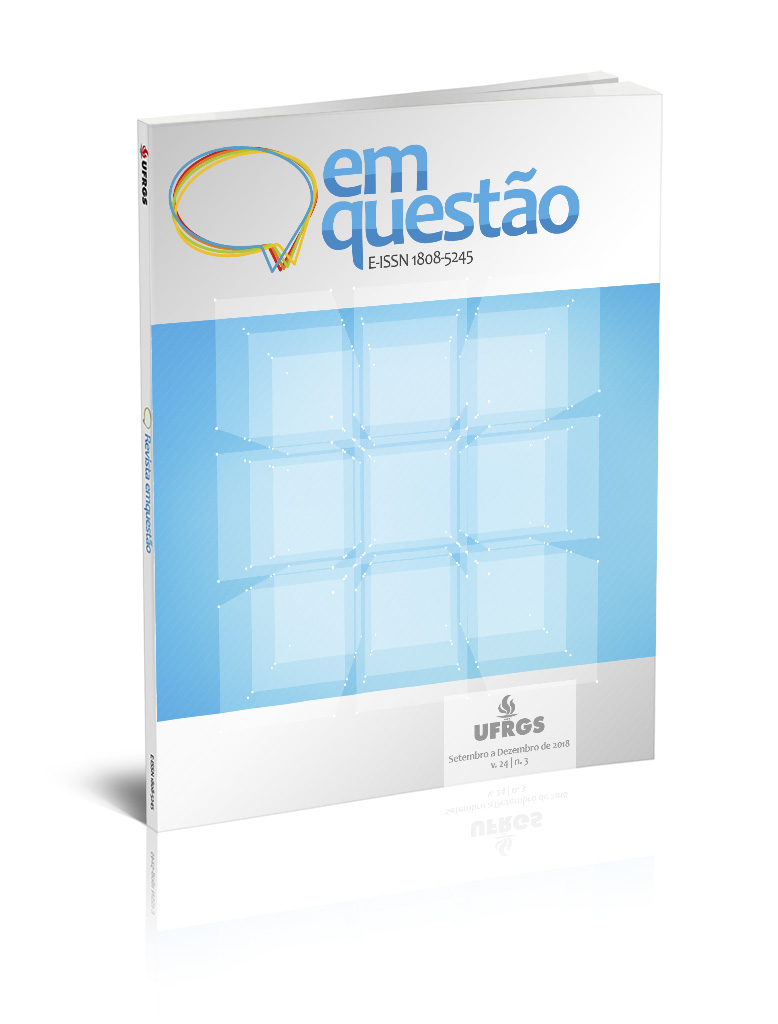The contribution of infocommunication competences in the work of the archivist as a mediator
DOI:
https://doi.org/10.19132/1808-5245243.38-67Keywords:
Infocommunication skills. Archivist. Mediation of informationAbstract
The objective of this article is to analyze the infocommunication competences developed by archivists and their contribution in the mediation process and in the training of information users. The research has a qualitativequantitative approach. Regarding the methodological procedures, a bibliographical and field research was adopted, with the online questionnaire used as data collection technique; the sample is composed of 53 archivists who work in the Brazilian archives (public and private). The data analysis is based primarily on the categories of analysis and in indicators developed to assess the infocommunication competences of archivists. The results showed that, in general, the infocommunication competences are more developed to identify the need for information, search and evaluate information, establishing and evaluating communication. However, we identified that archivists have difficulties both to appropriate the information they have access to and to act in a participatory and collaborative way. In this way, we concluded that the development of these competences directly influences the perception of their role as mediator of information and also in their performance.Downloads
References
ALMEIDA JÚNIOR, O. Mediação da informação e múltiplas linguagens. Pesquisa em Ciência da Informação, João Pessoa, v. 2, n. 1, p. 89-103, 2009.
BORGES, J. Participação política, internet e competências infocomunicacionais: estudo com organizações da sociedade civil de Salvador. 2011. Tese (Doutorado em Comunicação) - Universidade Federal da Bahia, Salvador, 2011.
BORGES, J; BRANDÃO, G. Competências em comunicação no ciberespaço: um novo desafio às organizações da sociedade civil. In: OLIVEIRA, L; BALDI, V. A insuportável leveza da web: retóricas, dissonâncias e práticas na sociedade em rede. Salvador: EDUFBA, 2014.
COMITÊ GESTOR DA INTERNET NO BRASIL. Pesquisa sobre o uso das tecnologias de informação e comunicação no Brasil: TIC Centros públicos de acesso 2013. São Paulo, 2014.
DUDZIAK, E. Competência Informacional e midiática no ensino superior: desafios e propostas para o Brasil. Prisma.Com, Porto, n. 13, p. 1-19, 2010.
GONZÁLEZ FERNÁNDEZ-VILLAVICENCIO, N. Alfabetización para una cultura social, digital, mediática y en red. Revista Española de Documentación Científica, Madrid, n. especial, p. 17-45, 2012.
GUERRA, I. C. Pesquisa qualitativa e análise de conteúdo: sentidos e formas de uso. Cascais: Principia, 2010.
JACOBSON, T. E.; MACKEY, T. P. Proposing a metaliteracy model to redefine information literacy. Communications in Information Literacy, Tulsa, v. 7, n. 2, p. 84-91, 2013.
JENKINS, H. Confronting the challenges of participatory culture: media education for the 21st century. Cambridge: MIT Press, 2009.
MACKEY, T.P.; JACOBSON, T. E. Metaliteracy: reinventing information literacy to empower learners. London: Facet, 2014.
MIRANDA, S. Como as necessidades de informação podemse relacionarcom as competências informacionais. Ciência da Informação, Brasília, v. 35, n. 3, p. 99-114, 2006.
NEVES, B. C. Mediação da informação para agentes sociodigitais: o salto. Ciência da Informação, Brasília, v. 40, n. 3, p. 413-424, 2011.
RIBEIRO, F. Da mediação passiva à mediação pós-custodial: o papel da Ciência da Informação na sociedade em rede. Informação & Sociedade: Estudos, João Pessoa, v. 20, n. 1, p. 63-70, 2010
SIEMENS, G. Conociendo el conocimiento. [S.l.]: Nodos Ele, 2010.
SILVA, A. M. Mediações e mediadores em Ciência da Informação. Prisma.Com, Porto, n. 9, p. 1-36, 2010.
WOLTON, D. É preciso salvar a comunicação. São Paulo: Paulus, 2006.
Downloads
Published
How to Cite
Issue
Section
License
Copyright (c) 2018 Em Questão

This work is licensed under a Creative Commons Attribution 4.0 International License.
Authors who publish with this journal agree to the following terms:
Authors will keep their copyright and grant the journal with the right of first publication, the work licensed under License Creative Commons Attribution (CC BY 4.0), which allows for the sharing of work and the recognition of authorship.
Authors can take on additional contracts separately for non-exclusive distribution of the version of the work published in this journal, such as publishing in an institutional repository, acknowledging its initial publication in this journal.
The articles are open access and free. In accordance with the license, you must give appropriate credit, provide a link to the license, and indicate if changes were made. You may not apply legal terms or technological measures that legally restrict others from doing anything the license permits.













